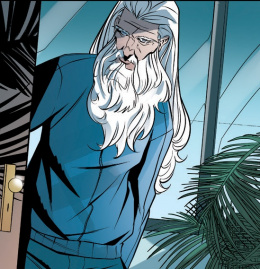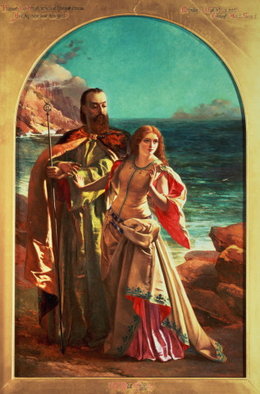Difference between revisions of "Paolo Prospero"
(→See Also) |
|||
| (15 intermediate revisions by 4 users not shown) | |||
| Line 1: | Line 1: | ||
| − | + | [[Image:Paulo_Prospero_Quo_Vadis_Cum_Hoc.JPG|thumb|260px|Paolo Prospero in 1997.]] | |
| − | [[Image: | ||
| − | '''Prospero''' is a [[human]] wizard | + | '''Paolo Prospero''' is a [[human]] wizard that is part of the [[White Council]]. |
| − | + | ==History== | |
| + | {{CIT|He has a daughter named Miranda, who may or may not still be alive.}} [http://www.s8.org/gargoyles/askgreg/search.php?qid=3638] {{CIT|He was also once the master of [[Caliban]] and [[Ariel]].}} | ||
| − | + | {{CIT|After breaking his staff, Prospero "found reason" to take up [[magic]] again.}} [http://www.s8.org/gargoyles/askgreg/search.php?qid=2960] | |
| − | + | In [[Timeline#1997|1997]], he welcomed [[Shahrizad]] to his [[Prospero's Estate|residence]] in [[Bermuda]]. Shortly after he and [[Monsieur Le Maire]] became enthralled by her tale about [[Thailog]], the two were soon ambushed by the [[clone]] [[gargoyle]] in his effort to steal the [[Hand of Valmont]] from Prospero's iron vault. Following the confusion, Prospero realized neither Thailog nor [[Brentwood]] had the talisman and attempted to use his magic to locate the true thief, but was unable to do so. ''([[Quo Vadis Cum Hoc?|"Quo Vadis Cum Hoc?"]])'' | |
| − | In Shakespeare's play ''The Tempest'', Prospero was once the Duke of Milan. He was far more interested in his studies (especially magic) than in governing his dukedom, and so placed its rule in the hands of his younger brother Antonio. Antonio, deciding that if he was going to do all the work, he might as well have the title as well, staged a coup with the help of King Alonso of Naples and banished Prospero and his then-infant daughter Miranda to a distant island. A sympathetic Neapolitan lord named Gonzalo helped Prospero take his books of magic with him, allowing Prospero to govern the island by his wizardry. He freed a sprite named Ariel from a tree that he had been imprisoned in by the island's previous ruler, a witch named Sycorax who had died before Prospero's arrival, gaining Ariel's services in return; he also made Sycorax's monstrous son Caliban his slave (and placed him under particularly close surveillance after Caliban tried to rape Miranda). | + | {{CIT|[[Greg Weisman]] has also hinted that he might be interested in helping a [[gargoyle]] and a human conceive a child.}} [https://www.s8.org/gargoyles/askgreg/search.php?qid=576][http://www.s8.org/gargoyles/askgreg/search.php?qid=9785] |
| + | |||
| + | ==Characteristics== | ||
| + | According to Shahrizad, Prospero doesn't trust modern technology unless he invented it himself. | ||
| + | |||
| + | He also favors comfort and has taken a liking to track suits. | ||
| + | |||
| + | ==Appearances== | ||
| + | * [[Quo Vadis Cum Hoc?|"Quo Vadis Cum Hoc?"]] (First Appearance) | ||
| + | |||
| + | ==Real World Background== | ||
| + | [[Image:Prospero_and_Miranda.JPG|thumb|260px|Prospero and Miranda]] | ||
| + | In [[William Shakespeare|William Shakespeare's]] play ''[[The Tempest]]'', Prospero was once the Duke of Milan. He was far more interested in his studies (especially magic) than in governing his dukedom, and so placed its rule in the hands of his younger brother Antonio. Antonio, deciding that if he was going to do all the work, he might as well have the title as well, staged a coup with the help of King Alonso of Naples and banished Prospero and his then-infant daughter Miranda to a distant island. A sympathetic Neapolitan lord named Gonzalo helped Prospero take his books of magic with him, allowing Prospero to govern the island by his wizardry. He freed a sprite named Ariel from a tree that he had been imprisoned in by the island's previous ruler, a witch named Sycorax who had died before Prospero's arrival, gaining Ariel's services in return; he also made Sycorax's monstrous son Caliban his slave (and placed him under particularly close surveillance after Caliban tried to rape Miranda). | ||
Twelve years after Prospero was exiled to the island, a ship bearing Alonso, Antonio, and many nobles of the Neapolitan court, including Alonso's son Ferdinand, passed close by. Prospero raised a storm that ran the ship and its passengers aground, planning to gain revenge on Alonso and Antonio for their overthrow of him. He also arranged the meeting of Ferdinand with Miranda; the two young people fell in love, and although Prospero pretended to oppose it, he was secretly pleased. As the former duke prepared to exact his final vengeance upon his betrayers (whom he had already tormented with hunger and thirst, among other woes), Ariel begged him to have mercy upon them, his own heart having been moved with pity for their sufferings. Deciding that it did not become a man to show less compassion and forbearance than a sprite, Prospero yielded to Ariel's pleas and spared Antonio and Alonso, though still persuading them to take him and Miranda off the island and restore him to his dukedom. He also abandoned his magic (breaking his wizard's staff and throwing his book into the sea) and set Ariel free. | Twelve years after Prospero was exiled to the island, a ship bearing Alonso, Antonio, and many nobles of the Neapolitan court, including Alonso's son Ferdinand, passed close by. Prospero raised a storm that ran the ship and its passengers aground, planning to gain revenge on Alonso and Antonio for their overthrow of him. He also arranged the meeting of Ferdinand with Miranda; the two young people fell in love, and although Prospero pretended to oppose it, he was secretly pleased. As the former duke prepared to exact his final vengeance upon his betrayers (whom he had already tormented with hunger and thirst, among other woes), Ariel begged him to have mercy upon them, his own heart having been moved with pity for their sufferings. Deciding that it did not become a man to show less compassion and forbearance than a sprite, Prospero yielded to Ariel's pleas and spared Antonio and Alonso, though still persuading them to take him and Miranda off the island and restore him to his dukedom. He also abandoned his magic (breaking his wizard's staff and throwing his book into the sea) and set Ariel free. | ||
| − | How much of this story is true in the [[Gargoyles Universe]], and how much Shakespeare's invention, is as yet unknown. | + | How much of this story is true in the [[Gargoyles Universe|''Gargoyles'' Universe]], and how much Shakespeare's invention, is as yet unknown. |
| − | ==See | + | ==See Also== |
*{{wikipedia|Prospero}} | *{{wikipedia|Prospero}} | ||
| − | [[Category:Canon | + | [[Category:Canon characters|Prospero, Paolo]] |
| − | [[Category:Humans]] | + | [[Category:Humans|Prospero, Paolo]] |
| − | [[Category:Real world characters]] | + | [[Category:Sorcerers|Prospero, Paolo]] |
| + | [[Category:White Council|Prospero, Paolo]] | ||
| + | [[Category:Real world characters|Prospero, Paolo]] | ||
Latest revision as of 16:39, 5 August 2024
Paolo Prospero is a human wizard that is part of the White Council.
History
He has a daughter named Miranda, who may or may not still be alive. [1] He was also once the master of Caliban and Ariel.
After breaking his staff, Prospero "found reason" to take up magic again. [2]
In 1997, he welcomed Shahrizad to his residence in Bermuda. Shortly after he and Monsieur Le Maire became enthralled by her tale about Thailog, the two were soon ambushed by the clone gargoyle in his effort to steal the Hand of Valmont from Prospero's iron vault. Following the confusion, Prospero realized neither Thailog nor Brentwood had the talisman and attempted to use his magic to locate the true thief, but was unable to do so. ("Quo Vadis Cum Hoc?")
Greg Weisman has also hinted that he might be interested in helping a gargoyle and a human conceive a child. [3][4]
Characteristics
According to Shahrizad, Prospero doesn't trust modern technology unless he invented it himself.
He also favors comfort and has taken a liking to track suits.
Appearances
- "Quo Vadis Cum Hoc?" (First Appearance)
Real World Background
In William Shakespeare's play The Tempest, Prospero was once the Duke of Milan. He was far more interested in his studies (especially magic) than in governing his dukedom, and so placed its rule in the hands of his younger brother Antonio. Antonio, deciding that if he was going to do all the work, he might as well have the title as well, staged a coup with the help of King Alonso of Naples and banished Prospero and his then-infant daughter Miranda to a distant island. A sympathetic Neapolitan lord named Gonzalo helped Prospero take his books of magic with him, allowing Prospero to govern the island by his wizardry. He freed a sprite named Ariel from a tree that he had been imprisoned in by the island's previous ruler, a witch named Sycorax who had died before Prospero's arrival, gaining Ariel's services in return; he also made Sycorax's monstrous son Caliban his slave (and placed him under particularly close surveillance after Caliban tried to rape Miranda).
Twelve years after Prospero was exiled to the island, a ship bearing Alonso, Antonio, and many nobles of the Neapolitan court, including Alonso's son Ferdinand, passed close by. Prospero raised a storm that ran the ship and its passengers aground, planning to gain revenge on Alonso and Antonio for their overthrow of him. He also arranged the meeting of Ferdinand with Miranda; the two young people fell in love, and although Prospero pretended to oppose it, he was secretly pleased. As the former duke prepared to exact his final vengeance upon his betrayers (whom he had already tormented with hunger and thirst, among other woes), Ariel begged him to have mercy upon them, his own heart having been moved with pity for their sufferings. Deciding that it did not become a man to show less compassion and forbearance than a sprite, Prospero yielded to Ariel's pleas and spared Antonio and Alonso, though still persuading them to take him and Miranda off the island and restore him to his dukedom. He also abandoned his magic (breaking his wizard's staff and throwing his book into the sea) and set Ariel free.
How much of this story is true in the Gargoyles Universe, and how much Shakespeare's invention, is as yet unknown.
See Also
- Paolo Prospero at Wikipedia, the Free Encyclopedia

